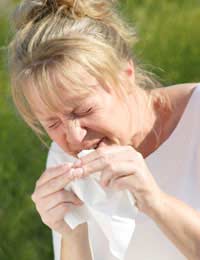Hay Fever and Allergies

People who suffer from hay-fever and allergies, find that contact lenses are not very comfortable to wear. Many people find it is better to wear their glasses when hay-fever or other allergies flare up.
The most common symptoms of hay-fever are itchy eyes and nose, sneezing, runny or blocked nose and difficulty in breathing. Exposure to pollen may also set off an allergic reaction as the conjunctiva (a membrane covering the whites of the eye) becomes inflamed and causes watery and itchy eyes. Some people experience a gritty feeling in their eyes. Dust and city pollution can make the condition even worse. It is worth checking with your GP or pharmacist about medications for hay-fever and allergies. Your GP and your optician will also be able to advise you about anti-inflammatory eye drops.
People who wear contact lenses may find that their eyes become very irritated. You do not have to stop wearing your lenses but if the symptoms become severe you may find it best to take them out. The best solution for hay-fever sufferers is to avoid pollen as much as possible by closing windows and keeping surfaces clear with a damp duster. But it is not always possible to keep completely away from pollen and dust. Here are some tips to ease the suffering:
- Try to avoid wearing contact lenses in hot, dry or dusty conditions. Wearing sunglasses at the same time may help to protect your eyes from dust and pollen.
- Avoid wearing contact lenses when you are gardening, particularly when mowing the lawn.
- If your eyes become dry, ask your optician for lubricating eye drops to ease the dryness. However, always seek professional advice from your optician or GP before using lubricating eye drops.
- When the pollen count is very high it is best to wear your glasses rather than your contact lenses.
- The level of pollen is usually lower in the evenings so you may find the symptoms ease during that time of the day.
- If your eyes become very sore and red take out your lenses immediately.
- Don’t sunbathe with your contact lenses in and be careful not to get suntan lotion on them after you have taken them out.
Treatments for Hay-Fever
There are a number of treatments available, ranging from antihistamines to decongestants. Always check with your GP or pharmacist before taking any medication. Antihistamines work by suppressing any swelling or inflammation on the eyes, throat or inside the nose. Anti-allergenic nose sprays and eye drops act as a defence against the release of histamine. Decongestants are very effective at relieving blocked noses.For severe cases of hay-fever your GP may prescribe steroid eye drops which can be very effective. However they can lead to serious side effects such as glaucoma, cataracts and damage to the cornea.
Other Tips
Other hints for alleviating the effects of hay-fever include:- Avoid going outside mid-morning or the early evening when the pollen count is highest
- Drive with the windows shut
- Keep your bedroom window closed at night
- Bathe your eyes in cold water at regular intervals
- Rosacea in the Eye
- Is a Vitreous Haemorrhage Serious?
- My Mum Has Macular Degeneration
- What is Vitrectomy Surgery?
- Why Do Eyelids Twitch?
- What is Graves' Ophthalmology?
- Retinal Vein Occlusion
- Retinitis Pigmentosa
- Corneal Disease
- Corneal Ulcers
- Nystagmus
- Flashes and Floaters
- Keratoconus
- Double Vision
- Eye Infections
- What Causes Dry Eye?
- Diabetes and Eyes


Re: Contact Lens Trials Explained
Hi Please could you put me in touch with your wholesale/distribution department. Which countries do you currently…
Re: What is Vitrectomy Surgery?
I had vitrectomy 4 weeks ago. The surgery was not well done as apparently bleeding occurred. The hole did not close despite having…
Re: Glasses or Contacts?
I need a eye exam and new glasses it's been since 2013/ I have no income I lost my boyfriend last September and I've been homeless ever…
Re: Eyewear for the Partially Sighted
This extract from your text is not clear and the grammar is poor- and the letters in the validation box are mixed…
Re: Eye Cancer Symptoms
I have yellow in both eyes lools like 2 dots. But looks like its makin the white part of my eye yellow whats wrong with me
Re: Are my Glasses Affecting my Eyes?
Hi, Please can anyone give advice on wearing varifocals. After a short while I develop a severe ache in my left eye and…
Re: Are my Glasses Affecting my Eyes?
On wearing my new varifocals, I am finding that my left eyeball hurts so much it feels like it will explode after 15…
Re: What is the Cause of my Itchy Eye?
I have One and only One itchy eye that has been going on 24/7 for 5 weeks.Eye is not swollen vision not affected. Eye doc…
Re: Contact Lens Trials Explained
Hi, We wanted to get in touch with you to increase traffic on your website. Please reply to this email so we can send you free…
Re: What Are Photoreceptors?
I have a 10 year old grandson who was diagnosed at apx 2 with cone and rod dystrophy eye disease. Please help with any treatment…